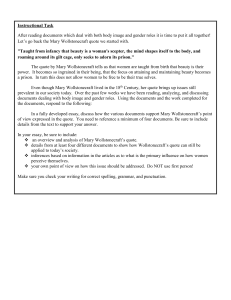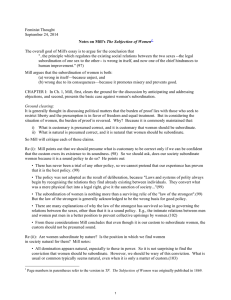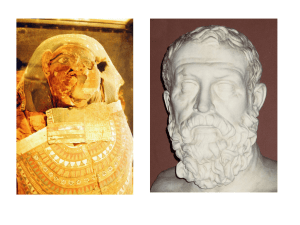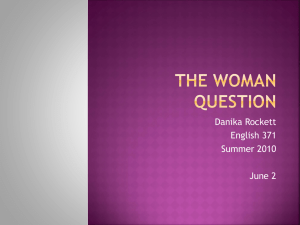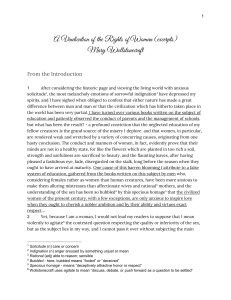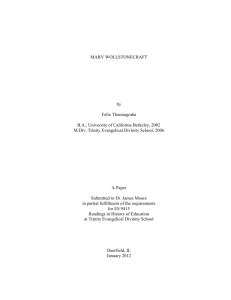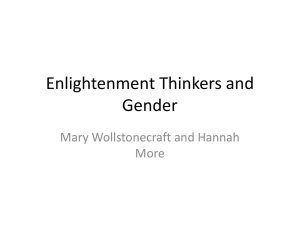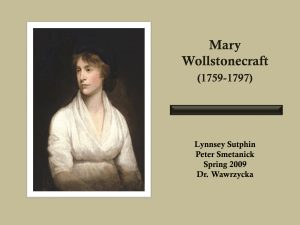Philosophy and Gender
advertisement
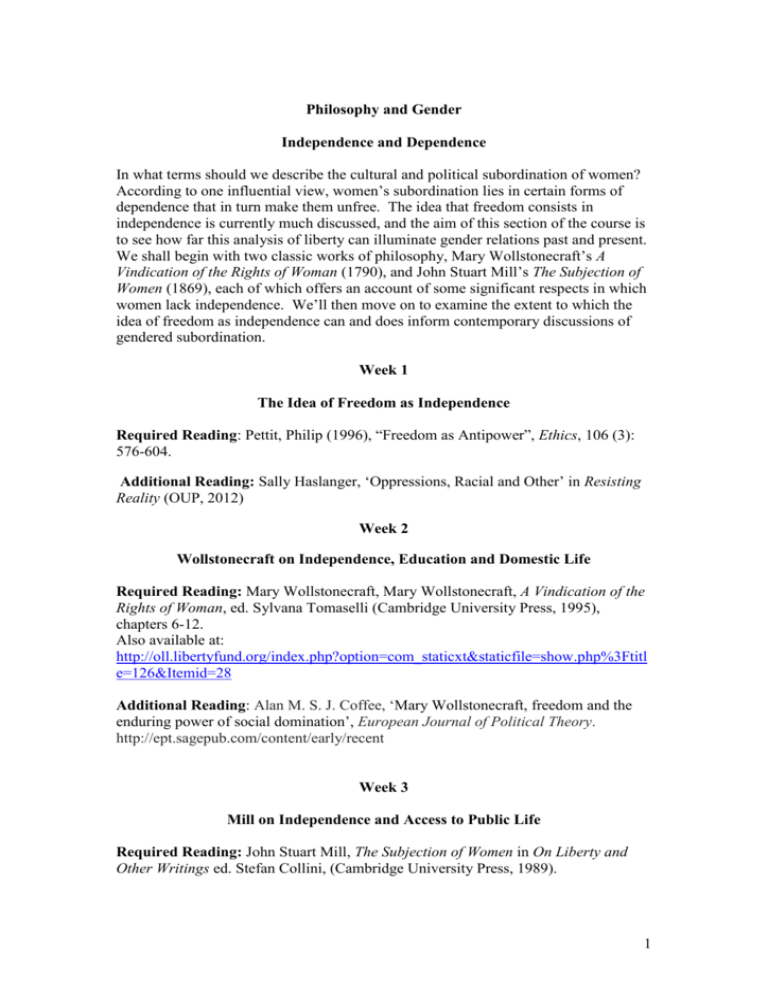
Philosophy and Gender Independence and Dependence In what terms should we describe the cultural and political subordination of women? According to one influential view, women’s subordination lies in certain forms of dependence that in turn make them unfree. The idea that freedom consists in independence is currently much discussed, and the aim of this section of the course is to see how far this analysis of liberty can illuminate gender relations past and present. We shall begin with two classic works of philosophy, Mary Wollstonecraft’s A Vindication of the Rights of Woman (1790), and John Stuart Mill’s The Subjection of Women (1869), each of which offers an account of some significant respects in which women lack independence. We’ll then move on to examine the extent to which the idea of freedom as independence can and does inform contemporary discussions of gendered subordination. Week 1 The Idea of Freedom as Independence Required Reading: Pettit, Philip (1996), “Freedom as Antipower”, Ethics, 106 (3): 576-604. Additional Reading: Sally Haslanger, ‘Oppressions, Racial and Other’ in Resisting Reality (OUP, 2012) Week 2 Wollstonecraft on Independence, Education and Domestic Life Required Reading: Mary Wollstonecraft, Mary Wollstonecraft, A Vindication of the Rights of Woman, ed. Sylvana Tomaselli (Cambridge University Press, 1995), chapters 6-12. Also available at: http://oll.libertyfund.org/index.php?option=com_staticxt&staticfile=show.php%3Ftitl e=126&Itemid=28 Additional Reading: Alan M. S. J. Coffee, ‘Mary Wollstonecraft, freedom and the enduring power of social domination’, European Journal of Political Theory. http://ept.sagepub.com/content/early/recent Week 3 Mill on Independence and Access to Public Life Required Reading: John Stuart Mill, The Subjection of Women in On Liberty and Other Writings ed. Stefan Collini, (Cambridge University Press, 1989). 1 Also available at: http://onlinebooks.library.upenn.edu/webbin/gutbook/lookup?num=16357 Additional Reading: Maria Morales, ‘Rational Freedom in John Stuart Mill’s Feminism’ in Nadia Urbinati and Alex Zakaras eds., J.S. Mill’s Political Thought. A Bicetennial Reassessment. Week 4 Independence and Care Required Reading: Marilyn Freedman, ‘Pettit’s Civic Republicanism and Male Domination’ in Laborde, Cécile and Maynor, John (eds.) (2008), Republicanism and Political Theory, (Oxford: Blackwell Publishing), Chapter 8. Additional reading: Eva Kittay and E.K. Feder, The Subject of Care: Feminist Perspectives on Dependency, (Rowman & Littlefield, 2003), chs 1, 2 and 5. Week 5 Internalising Dependence: Adaptive Preferences Required Reading: Serene J. Khader, Adaptive Preferences and Women’s Empowerment (available at Oxford Scholarship Online), chapters 1 and 2. Additional reading: Ann Levey, ‘Liberalism, Adaptive Preference and Gender Equality’, Hypatia 20 (2005). Essay Questions 1. According to Wollstonecraft, the situation of women undermines the freedom of both women and men. Critically assess her analysis of the ways in which it does so. 2. 3. Can Pettit’s account of arbitrary interference satisfactorily determine when women are and are not dependent? 3. ‘Mill’s tacit appeal to what is natural undermines his account of the subjection of women.’ Critically assess this claim. 4 Are caring relations incompatible with independence, and thus with a republican conception of freedom? 5. Analyse the role and limitations of care in helping dependent groups to become more independent 5 When is a preference adaptive? 2 Pettit, Philip, ‘Republican Freedom: Three Axioms, Four Theorems’ in Laborde and Maynor eds., Republicanism and Political Theory, Chapter 5.And other papers, see above. Clare Chambers, Culture, Sex and Justice. The Limits of Choice. Susan Okin, Is Multiculturalism bad for Women? Catriona Mackenzie and Natalie Stoljar. Feminist Perspectives on Autonomy, Agency and the Social Self Nancy Hirschman, The Subject of Liberty. Toward a Feminist theory of Freedom 3
